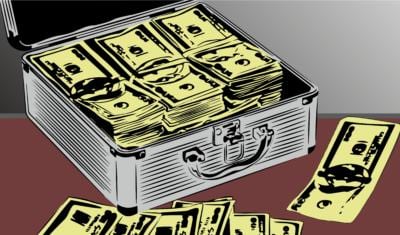
It can be complicated to understand the federal laws surrounding money laundering and to build a solid defense strategy that reduces the likelihood you will be found guilty of this offense.
You need a federal criminal defense attorney with experience handling cases related to laundering of funds. LV Criminal Defense can help.
Our legal team provides representation to clients in California, Arizona, Oregon, Nevada, Utah, or surrounding areas who have been accused of laundering money. We can help you to develop the best approach to dealing with investigators and responding to charges so you can reduce the likelihood of a guilty verdict or so you can limit the penalties that you face.
Just give us a call today to find out about the assistance we can offer when you’ve been charged with a federal money laundering offense.
The main federal statute that defines the crime of money laundering and imposes penalties upon defendants who are convicted is found in 18 U.S. Code section 1956. According to the relevant statute,it is unlawful to:
Nick Wooldridge has a long track record of representing clients accused of serious federal and state crimes in Nevada.
In addition to proving that you conducted financial transactions despite knowing that those transactions involved funds obtained from unlawful activity, a prosecutor must prove that you engaged in these behaviors with a specific intent. You can be convicted of a federal money laundering offense only if you engaged in these behaviors in order to:
Essentially, the statute aims to make clear that any time you knowingly try to hide the origins of money obtained through unlawful activity, you can be found guilty of money laundering. You can also be found guilty of money laundering for trying to hide funds from the IRS or evade requirements that particular financial transactions should be reported.
The statute also prohibits transporting monetary instruments from locales outside of the United States to promote unlawful activity.
It’s important to note, however, that the statute indicates you can be charged with money laundering only if you are trying to hide the proceeds of specified unlawful activities. Specified unlawful activities include those listed in section 1961(1) of Title 18, which is the federal law that deals with racketeering activity.
Penalties for money laundering vary depending upon the specific circumstances. If you conceal money obtained from an unlawful activity for purposes of evading transactional reporting requirements, for purposes of evading tax laws, or to hide the origins of the money, you could face financial penalties equal to $500,000 or double the value of the property in the transaction. You could also be imprisoned for up to 20 years.
When I initially met with Mr. Wooldridge, he took the opportunity to sit and go over my problem with me. He described details in my case which he found disturbing and explained why he I should have him on my side.
You could also face civil penalties, including fines and financial consequences equal to $10,000 or the value of the money and property that was involved in the unlawful transaction.
When you face a civil action, rather than a criminal one, it’s important to realize that the potential consequences may not be quite as severe but that the burden of proof differs so it is more likely that you will lose your case. You cannot go to jail if you lose in a civil case, but you can face very substantial financial losses if you are found to have violated the law. This means that you still need to take these cases very seriously.
If a civil action is brought against you for money laundering, the burden of proof is lower than the beyond a reasonable doubt standard that is applicable in all criminal cases. If it is proved by a preponderance of the evidence that you engaged in money laundering – which means that the evidence suggests it is more likely than not to be true that you laundered funds, you can be found liable and made to pay substantial civil penalties.
Because it is easier for a case to be proved against you in civil court, it is possible that you could be found innocent of all criminal charges and still end up owing a substantial mount of fines and penalties.
Your assets are also at risk because of criminal or civil asset forfeiture, which means that it is possible for property to be taken from you even before conviction if law enforcement suspects that the funds came from the proceeds of unlawful activities.
IRS – Money Laundering Crimes
110 N City Pkwy,
Las Vegas, NV 89106
+1 702-868-5005
DOJ – Money Laundering and Asset Recovery Section
100 W Liberty St # 600,
Reno, NV 89501
+1 775-784-5438
A federal criminal defense attorney at LV Criminal Defense can help you to take steps to respond to allegations of money laundering. Our firm will work closely with you to respond to an investigation, to determine how to plead, and to develop a comprehensive defense strategy. We can help you if you are facing criminal charges or if you are facing civil proceedings and the steps that we take will be aimed at protecting your freedom and your finances in every situation.
You need to take allegations of money laundering very serious, and our legal team has the knowledge and skill necessary to help you fight accusations that could change your life.
To find out more about how we help residents in California, Arizona, Oregon, Nevada, Utah, or surrounding areas who have been accused of money laundering, give us a call today.